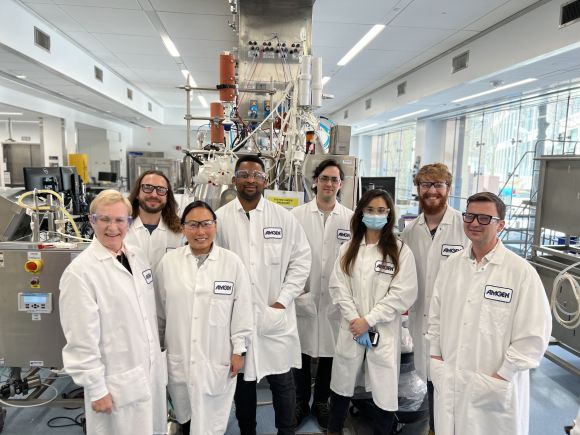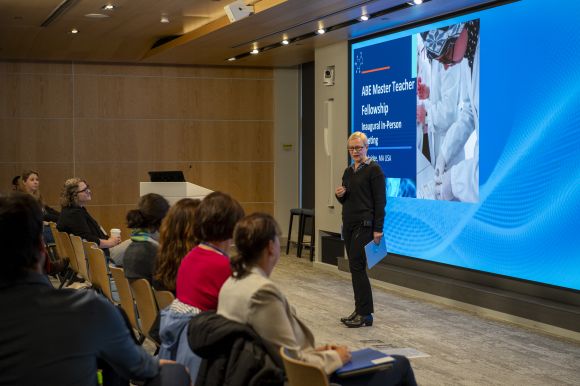When Margaret Faul was growing up in Dublin, Ireland, she thought she had only a few career choices: doctor, teacher, accountant. Coming from a family who worked in healthcare and business, scientist was not on the list. Although she did not know what a scientist's career might look like, her curiosity drove her to explore the possibility.
“When I said I wanted to be a scientist, I didn’t really know what that meant and what were the career options,” Faul says. “What I did know was that I was curious, and I wanted to figure it out.” Only after doing some internships in college did she start to see her path.
Now vice president of Drug Substance Technologies and site head of Amgen Massachusetts, Faul leads a team of scientists, engineers, and others developing new treatments for patients worldwide. Reflecting on her journey from high school chemistry to industry leader, Faul values now more than ever the role of early education in shaping the future of science.
“Programs like ABE empower us to show students the cutting-edge science we do every day so they can get excited and motivated by this kind of career path,” Faul says. “Our job is to grow and develop the next generation of scientists.”
Having early skills in math and science is not always enough, she says. Experiencing research firsthand can be a catalyst for a path in science, as Faul saw in her own journey.

Always interested in chemistry—thanks in part to family members’ who worked in medicine and pharmacy—Faul attended University College Dublin eager to study chemistry, biochemistry, and pharmacology. She was on the hunt for new problems to solve and found chemistry labs a fun challenge. After narrowing her focus to synthetic organic chemistry with a minor in pharmacology, she embarked on two internships at a local pharmaceutical company.
At the company, Faul worked on a manufacturing problem: figuring out how to recover material from a drug batch they had essentially lost. “I found it fascinating! Solving the technical puzzle sparked an interest in pursuing a career in research and development in the pharmaceutical industry,” she recalls. She also had a mentor whose own enthusiasm for the job was inspiring.
Because most of the pharmaceutical work in Ireland at the time was in late-stage manufacturing, Faul decided to pursue a PhD in the United States to learn more about the earlier stage of research and development. After earning her PhD at Harvard University, she started working at Eli Lilly in Indianapolis before joining Amgen Thousand Oaks in California, and later moving to Amgen Massachusetts in 2023.
Over the past 30 years in industry, she has worked in multiple parts of drug development, including research and development for both synthetic and biologic drug substances and drug product, which works on the form a drug takes (e.g., syringe, tablet). She also had roles in manufacturing, working to deliver supply to support Amgen’s clinical and commercial products.
“Over time, my work has closed the loop of most everything that's required in developing new kinds of molecules for serious illnesses,” Faul says. “I've worked on the majority of Amgen’s clinical portfolio with different teams while contributing to the development or support of most commercial products, which is very rewarding.”
For students just starting out on a potential path in biotechnology, Faul advises them to reach out to parents, teachers, and ultimately professors and professionals to learn more about areas of interest. That early network building is vital.
She also advises students to think about how developments in automation, digitization, and artificial intelligence (AI) can complement their skillset. At places like Amgen and across industry, teams are increasingly using AI tools like ChatGPT in a variety of roles to help them process large datasets and contribute to problem solving.
But above all, Faul hopes to see more students recognize science as a fun career. “Science is a great career. It enables diverse opportunities for everyone to contribute. There's room to be creative. There's room for business-oriented roles. There's the ability to lead teams. And programs like ABE and others through the Amgen Foundation can help students navigate through the field and really understand the value that a career in science can bring.”
